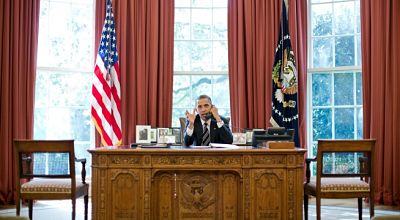Would Obama Re-election Hurt Charitable Giving?
Share:
If President Obama gets re-elected, would gifts to charitable organizations suffer? It’s likely, according to a new national study sponsored by Dunham+Company.
The survey found that 21 percent of donors would decrease their giving if Obama wins Nov. 6. This compares to 16 percent should Mitt Romney be elected.
“In addition to this finding, the survey also showed that giving from the most generous households in America could take a significant hit depending on the election result,” says Rick Dunham, president and CEO of Dunham+Company. “A sizeable 45 percent of conservative donors, which have been shown to be the most generous donors per capita in America by numerous studies including one recently by The Chronicle of Philanthropy, say they will give less if Obama is re-elected. And one in three donors age 60 or older, another key demographic, says the same.”
Data from the Center on Philanthropy at Indiana University indicate that the older the individual, the higher the participation in philanthropy. The highest percentage of participation in philanthropy is with donors over age 65, with three out of four households (75 percent) in this demographic giving compared to only 52 percent in households 40 years old or less.
Compounding the concerns about the result of the presidential election, 21 percent of respondents said they would give less if Obamacare was allowed to stand versus 11 percent who said their support would decrease should it be repealed.
The survey asked donors if they would give more, less or the same in response to factors like the election, implementation of Obamacare and action on the federal debt limit. Examining the “net impact” donors say these factors would have shows that a Romney victory is likely to spur higher giving. The net impact is the percentage who say their giving would rise minus those who say it would fall in the coming year as a result of each item.
Romney supports repealing Obamacare, reducing federal spending and keeping gasoline prices in check by stimulating oil production, things that donors say would encourage them to give more—or at least not cause them to give less.
Of special note is the importance of protecting the charitable tax deduction. Donors say the failure to do that would have the greatest negative impact on their giving next to rising gas prices. When asked about the elimination of the charitable tax deduction, 33 percent of donors said it would cause them to reduce their giving and only 2 percent said it would increase their giving, leaving a 31 percent variable. Currently Romney is vague about how he will treat the charitable tax deduction for all earners and Obama says he wants to limit the deduction for high income earners.
“While most are not thinking about charitable giving and the outcome of the election, it is in fact, a significant issue for America as giving has dropped precipitously since 2007,” Dunham says.
Based on Giving USA data, charitable giving in America has seen a drop of historic proportions, from a high of $311 billion in 2007 to $274 billion in 2009, and is struggling to recover, with $298 billion reported for 2011. At the current pace, the Center on Philanthropy estimates it will take five years just to regain 2007 levels of charitable giving.
Share:














































